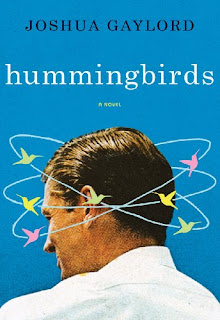The Carmine-Casey prep school girls flutter through Gaylord's debut, but they're not alone; their teachers are insecure flirts and cheats amid divorces and trysts. One such teacher is Leo Binhammer [...] [and] the charismatic Ted Hughes [...]
Meanwhile, student Dixie Doyle and her peers lounge outside the school in their pleated skirts, emanating Lolita-like accidental sexuality.
Binhammer, who is unapologetic about his attraction to the students, tries to connect with Liz Warren, the playwright in his class, before Ted charms her.
Similarly competitive, Liz and Dixie vie for attention from the few adult men around the school, and the complicated web of loyalties, attraction, competition and camaraderie provides much tension as things play out—but not in an expected way [...]
Gaylord's tale of overeducated men and the teenage students who exhibit the finesse and understanding their teachers lack hits all the right notes.
In the first draft of our, God willing, forthcoming book, the recap of Hummingbirds runs about 15 pages, but for the purposes of keeping this post an appropriate blog length, we'll recap the recap.
Before we begin, you may find it interesting to learn that Gaylor taught English at an Upper East Side prep school, which is the setting of Hummingbirds (i.e., Fifth Avenue and Central Park). Autofiction?
In the novel, adults repeatedly reminded Binhammer that the Carmine-Casey schoolgirls were attracted to him (i.e., their English teacher.) “You know how the girls adore you.”
And the schoolgirls repeatedly reminded Binhammer that they were attracted to their English teacher as well.
“Mr. Binhammer, do you want to see pictures of me in Saint-Tropez? But you can’t look at all of them, because over there you’re not supposed to wear a top on the beach.” Topless schoolgirls?!
Mr. Binhammer even had: “[...] an unofficial fan club - this group of girls who go around calling each other Mrs. Binhammer.” “Those girls - you’ve seen them - they would die for him. They’re loyal as Nazis. Little love Nazis.”
By page 3, we were introduced to the convincing and nubile nymphet Dixie Doyle - a senior and “pretty girl with ironic pigtails”. Dixie:
[...] could convince grown men of anything [...] she possesses a quality of performed girlishness that turns sex into a ragged paradox for men beyond the age of thirty.
In particular, Dixie's attraction to Mr. Binhammer was highlighted throughout the novel. For example, after their first class together, Dixie stayed behind.
“Great class, Mr. Binhammer.”
What she’s thinking about as she says this is that Binhammer’s tie is a little crooked. She feels her hands wanting to reach out and straighten it for him. She would straighten the tie and then smooth her hands down the front of his jacket, as though he were her mannequin husband.
At the school’s play, Dixie spotted Mr. Binhammer. Consequently, she twirled a strand of hair around her finger (i.e., an IOI), and she came up with the idea: “[...] to write a play about herself and her favorite teacher” in which she attempted to convince her teacher to ignore the dangers of a student-teacher affair.
Then she sees him, Mr. Binhammer, down in front leaning against the wall. Twirling one strand of hair around her finger, she thinks that she would like to write a play about herself and her favorite teacher:
“You know we can’t, Dixie. It would be too dangerous.” Reaching out to her but pulling back his hand at the last minute. “People wouldn’t like it.”
“Why do you care about people all of a sudden?”
“Maybe you’re right. How is it that you see things so clearly?”
And Dixie decided at the very moment that she would have sex with her English teacher, but she wondered if Mr. Binhammer realized how very easy it would be for him to have sex with a schoolgirl.
Subsequently, Binhammer informed Dixie that if he weren’t married “nothing” could hold him back (i.e., only marriage gave him the strength to resist the allure of a nymphet).
“You know what?” he says, and his words are a gift wrapped in curling ribbons. “If things were a little different. If I weren’t married. Then there’s nothing that could hold me back.”
How did Dixie respond? She lit up: “[...] from the inside like a brand-new jack-o’-lantern.”
Mr. Hughes, with his “wide jaw”, “nice hair” and “ringless finger”, was described as:
[...] the smart girl’s dream [...] He will leave a trail of Carmine-Casey girls in his wake - girls writing morbid poetry in their journals at night and feeling suddenly uncomfortable in their starched clothes.
None of them will say anything about Ted Hughes, because each one will believe in her heart that her own relationship with the man is secret and supreme.
And that’s when the suicides will start. Because no girl loves Ted Hughes for long before she has to kill herself from an overdose of passion.
Liz Warren, another Carmine-Casey schoolgirl: “[...] rarely thought about her teachers in intimate terms,” with exception is Mr. Hughes: “[...] who sometimes looks at her hard and makes her chest feel warm [...]”
In addition, Liz opined that Mr. Hughes possessed: “[...] something beautiful. She could stare at him and do nothing and be quite content.” And Liz kept “inconspicuously on her desk in her bedroom” a poem that Mr. Hughes wrote about Slyvia Plath. When Liz caught a glimpse of Mr. Hughes in the hallway her spine would go: “[...] taut, instant erasure of all those other bodies between her and him [...] His presence [was] always in the back of her mind, thudding away like a headache..”
Subsequently, Mr. Hughes and Liz kissed in a Central Park underpass. Consequently, he gave her his address, “I’ll meet you there,” he said, “in an hour,” where, after they ordered General Tso’s chicken and watched The Third Man, Liz’s English teacher took her virginity.
And she waited for it in the dark, and then she felt it, like a pressure between her thighs—it was inside her, inside her, and it was happening, and she was thinking of a million things [...] And then there was something that replaced the thinking [...] the way her hands gripped the shoulders of this man, this man, and the way her nipples felt when his chest brushed against them, and everything else went away except her ankles and her spine and her belly and her teeth and—
Afterward, she went to the bathroom and turned on the light and looked at herself in the mirror. There was no hurry in her gut now. Just a peacefulness.”
“Not a virgin,” she whispered.”
Unfortunately for Mr. Hughes, Liz was spotted leaving her English teacher’s apartment (building) at 2:00 AM.
The teleiophilia and raunchy schoolgirl behavior wasn’t only directed at Binhammer and Hughes. For example, there was Monica with her “sharp eyes, black hair, [and] a striking smile” who, after seeing Paulo, the cleaning man vacuuming outside her bedroom, informed Liz, “Maybe I’ll bring Paulo to the prom. What would Dixie Doyle say then? “At least he looks the part. He’s kind of attractive, don’t you think?”
Mr. Landry, the headmistress, shared with Binhammer that she: “[...] got a call from a parent just two weeks ago giving her ninth-grade daughter permission to leave school when her boyfriend, who is a freshman in college, came to pick her up in his car.”
As for raunchy schoolgirl behavior, one school day, Binhammer caught two schoolgirls, whom were described as: “[...] enthralling, these two glowing daughters of the social elite [...]”, throwing sex dice in a stairwell. What are sex dice? They’re pink and instead of dots, the sex dice have words on them such as: KISS, LICK, SUCK, STROKE, SQUEEZE, BLOW, FINGERS, TOES, GENITALS, CHEST, STOMACH, and EAR.


















.jpg)






